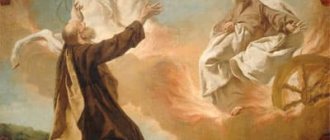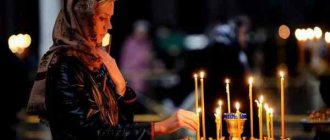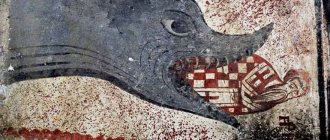One of the most significant duas in Islam is the prayer “Rabbana-atina...” (according to the first words of its text)
which the faithful repeat daily and repeatedly.
After performing each prayer, Muslims should pray to the Almighty for forgiveness of sins and thank the Creator for everything given. The dua “Rabbana” is used as such a prayer, the full text of which is as follows:
“Rabbanya atinya fid-dunya hasyanyatan wa fil-akhyirati hasyanyatan wa kynya 'azabannar. Rabbanya-`firli wa livalidyaya walil-mu`mininya yaumya yakumul-hisaab"
Translation
of the meaning : “Our Lord! Grant us goodness in this world and goodness in the Hereafter, and protect us from torment in the Fire. O our Lord! Accept our repentance and grant forgiveness on the Day of Judgment to me, my parents and all the faithful!”
Advantages of Dua
1. Mention in the Koran
The first part of this dua is mentioned in Surah Baqara:
“But among them there are those who say: “Our Lord! Grant us...” (2:201)
According to scholars, this verse suggests that our Creator accepts the prayers of all people, regardless of whether they are Muslims or non-believers, God-fearing or sinners. However, this does not indicate a person’s closeness to the Lord of the worlds. His love is manifested, first of all, when the Creator guides the believer on the true path and allows him to observe religious practices in the proper way.
2.
Reading during prayer
The prayer “Rabbana” is repeated daily by believers in every prayer. It is read during the final sitting, after reading the dua “Salavat”.
Its pronunciation is considered desirable (sunnat) in prayer. For it, the Muslim is awarded a reward, but for abandonment the sin is not recorded. This is confirmed by the verse of the Holy Quran following the dua “Rabbana”:
“They have a share for what they have acquired” (2:204)
3. Favorite dua of the Prophet Muhammad (s.a.w.)
This prayer is considered the most favorite dua of the Messenger of Allah (s.a.w.). This is evidenced by the hadith cited by Sahab Anas ibn Malik.
Dua Subhanaka
Reading: “Subhanakallahumma wa bihamdik. Ua tabaraqasmuk. Wa taala jadduk (wa Jaalla sanauuk). Wala ilaha gairuk."
When it is read: In prayer, at Kiyama. 1- At the first rak'ah of all prayers, after reciting iftitah takbir. 2- Before Fatiha of the third rak'ah of the Sunnah of the pre-evening (Asr) prayer. 3- When fulfilling the first sunnah of the night (ishaa). In the third rak'ah, before reading Fatiha. 4- If the Tarawih prayer is performed in four rak'ahs, then it is read after standing up for the third rak'ah before Fatiha 5- During Janaza prayer. “wa Jaalla sanauuk” is added only when performing Janazah prayer, after the first takbir.
The audio tag is not supported by your browser. Download.
Attahiyyat
Reading: Attahiyyatu lillahi wassalauatu uattayyibat. Assalamu alaika ayuhannabiyu wa rahmatullahi wa barakatuh. Assalamu aleyna wa ala ibadillahissalihin. Ashhadu anla ilaha illallah. Wa ashhadu anna Muhammadan abduhu wa Rasulukh.
Where to read:
In all tashahhuds (seats) of prayer.
The audio tag is not supported by your browser. Download.
Allahumma sally
Reading:
Allahumma salli ala Muhammadiuua ala ali Muhammad. Kama sallayta ala Ibrahim wa ala ali Ibrahim. Innaka hamidummajid.
The audio tag is not supported by your browser. Download.
Allahumma barik
Reading:
Allahumma barik ala Muhammadiuwa ala ali Muhammad. Kama barakta ala Ibrahim wa ala ali Ibrahim. Innaka hamidummajid.
Where they read:
1- In the last sitting of all prayers, after reading the attahiyat.
2- In the first sitting there is a sunnah of prayer: Asra and in the first sunnah of Ishaa prayer.
3- After the second takbir of Janah prayer.
The audio tag is not supported by your browser. Download.
Rabbana atina
Reading:
Rabbana atina fiddunya hasanatan. Wa fil akhirati hasanatan. Huakina azabannar.
Where it reads:
1- At tashahhud after “Allahumma salli” and “Allahumma barik”.
2- For those who have not yet learned the “Qunut Dua”, you can read this dua while performing Witr prayer.
3- Anyone who does not know what dua to read after the third takbir of Janazah prayer, you can read “Rabbana Atina”.
The audio tag is not supported by your browser. Download.
Dua Qunut
Reading:
Allahumma inna nastainuka uanastagfiruka uanastakhdik. Wa nu`minubika huanatubu ilike. Uana tauakkalu alaika ua nusni alaikal haira. Kullahu nashkuruk wala nakfuruk. Wa nahlau wa natruku mayyafjuruk.
The audio tag is not supported by your browser. Download.
We read:
Allahumma iyaka nabudu ualaka nusalli wa nasjud. Wa ilaika nasya wa nakhfid. Narju rahmataka ua nakhsha 'azabaka. Inna 'azabaka beat kuffari mulhik.
Where it reads:
In the third rak'ah of Witr prayer after Fatiha and a short surah. Before reading, raise your hands to your ears making takbir, and then put your hands back as during prayer.
The audio tag is not supported by your browser. Download.
Surah al-Fatiha
Reads:
“Al-hamdulillahi rabbil aalamin. Ar-Rahmanir Rahiim. Maliki Yaumiddin. Iaaaaaa nabudu yaaaaaaa nastain. Ikhdinas-syrotal mustakim. Syrotallazina an a'mta aleihim gairil magduubi aleihim wa laddolliin."
The audio tag is not supported by your browser. Download.
Sura Fil
Reads:
“Alam tara kaifa fa'ala rabbuka bi ashabil fil. Alam yaj'al kaidahumphii tadliil. Wa arsala alaihim toyron ababil. Tarmihim bi-hijaratim min sijjil. Fa ja'alakhum kaasfim ma'kuul."
The audio tag is not supported by your browser. Download.
Surah Quraysh
Reads:
Li iyalafi kuaraish. Iylaafikhim rikhlatash-shitaa-i was-sayf. Fal ya'budu rabba hazalbayt. allazii atomahimin juuin wa aamaaah min hauf.
The audio tag is not supported by your browser. Download.
Sura Maun
Reads:
“Ara aitallazii yukazzibu bid-diin. Fa-zaalikallazii yadu-ul yatiim. Wa laa yahud-du alaa ta-amil miskiin. Fa wai lul-lil-musalliin. Allaziinahum an solathim sahuun. allaziinahum yura-un. Wa yamna-unaal maa-uun.”
The audio tag is not supported by your browser. Download.
Surah Kausar
Reads:
“Innaa a-tainaa kal kausar. Fa solli li rabbiqa one-har. Inna shaani-aka hual-ab'tar."
The audio tag is not supported by your browser. Download.
Surah Kafirun
Reads:
“Kul yaa ay-yuhal kaafirun. Laa a-budu maa ta-buduun. Wa laa antum aabiduuna maaa a-bud. Wa laa ana aabiduna maa abadtum. Wa laa antum aabiduuna maa a-bud. Lyakum diinikum ua liyadiin.”
The audio tag is not supported by your browser. Download.
Surah Nasr
Reads:
“Izaa jaaaa nasrullahi wal fatah. Wa ra-aitannasa yad-huluuna fii diinillahi af-waja. Fasabbih bi hamdi rabbiqa was tagfirkh, innahu kaana tauuaaba.”
The audio tag is not supported by your browser. Download.
Surah Tabbat
Reads:
“Tabbat yadaa abi lahabi wa tabb. Maaa agnaa an-hu maa luhu wa maa kasab. Sayasla naaran zyata lahab. Uam-ra-atuh. Hamma latal khatab. Fii zhiidi haa hablum mim masad"
The audio tag is not supported by your browser. Download.
Surah Ikhlas
Reads:
“Kul huuallahu ahad. Allahus-somad. Lam yalid wa lam yuulad. Wa lam yakullahu kufuan ahad.”
The audio tag is not supported by your browser. Download.
Cheers falyak
Reads:
“Kul a-uuzu birabil falyak. Min sharri maa halyak. Ua min sharri gaasikin isaa uaqab. Ua min sharrin-naffaasaati fil ukad. Wa min sharri haasidin isaa hasad.”
The audio tag is not supported by your browser. Download.
Cheers for us
Reads:
“Kul a-uuzu bi rabbin-naas. Maalikin naas. Ilyakhin naas. Min sharril wasuaasil hannaas. Allazi yuuasuisu fii suduurin naas. Min-aljinnati one naas.”
The audio tag is not supported by your browser. Download.
Ayatul Kursi
Reads:
“Allahu la ilaha illahu. Al Hayyul Qayyum. La ta'huzuhu sinatun wala naum. Lahu mafissamauati uama fil ard. Man zallazi yashfayu yindahu illa bi iznikh. Ya'lamu ma bayna aidihim uama halfahum wala yuhituna bi shayin min 'ilmihi illa bima sha. Ua sia kursiyuhnssamauati wal ard. Wala yauduhu hifzukhuma wa hual aliyul azyim.”
The audio tag is not supported by your browser. Download.
The essence of Rabban's verses... Part II
“Amana-r-rasulne” uky! (Read “Amana-r-rasul”) this expression can be heard in almost every mosque, mazlis, etc. What's the matter and why are these last two verses so popular among Muslims?
|
The fact is that these two verses from Surah al-Baqarah are universal and have a special status in the life of a Muslim, according to numerous statements and explanations of the Messenger of Allah, may Allah bless him and grant him peace. Let's look point by point at what values these last two verses from the largest sura in the Koran, al-Baqarah, carry. 1) Reading these two verses before going to bed is enough for a Muslim as protection from the instigations of the devils at night. It is narrated from Ibn Masgud that the Messenger of Allah, may Allah bless him and grant him peace, said: “Whoever reads the last two verses from Surah al-Baqarah at night, they will be sufficient for him.” (Bukhari) On this matter, scholars disagree, some suggest that these two verses will be sufficient to prevent one from spending the whole night in prayers, others believe that this protects against Shaitan, while others say that this protects from all disasters and misfortunes. 2) The last two verses from Surah al-Baqarah are treasures from under the Throne of the Most High. It is narrated from Abu Zara that the Messenger of Allah (peace and blessings of Allah be upon him) said: “I have been given the last verses of Surah al-Baqarah from the treasures under the Throne (of Allah), which were not given to any prophet before me.” (Ahmad) It was narrated from Uqba ibn Amir that the Messenger of Allah (peace and blessings of Allah be upon him) said: “Read the last two verses from Surah al-Baqarah, verily I took them from the treasures under the Throne.” 3) The last two verses from Surah al-Baqarah were given to the prophet during the ascension of the Prophet (peace and blessings of Allaah be upon him) to the seventh heaven. During the ascension of the Messenger of Allah, may Allah bless him and grant him peace, to the seventh heaven, he was given three things: five (daily) prayers; the last verses of Surah al-Baqarah; and the introduced elements are forgiven to those from his ummah who did not associate partners with Allah. 4) The Ummah of Muhammad, may Allah bless him and grant him peace, surpasses the other Ummahs of the prophets with the last two verses from Surah al-Baqarah. It was narrated from Hudhaifa that the Messenger of Allah (peace and blessings of Allah be upon him) said: “We are superior to other people (other ummahs of the prophets) in three (things): these are the last two verses from Surah al-Baqarah, which were given from the house of treasures which is under the Throne, which were not given to anyone before me, and will not be given to anyone after me.” 5) Leaving the recitation of these verses defies Islamic reason. It is narrated from Harith from Ali, who said: “I do not see the Islamic mind in the one who goes to bed before reading “Ayat-ul-Kursi” and the last verses of Surah al-Baqarah, because, verily, they are given to you. to the Prophet, may Allah bless him and grant him peace, from the treasures under the Throne of the Most High.” 6) The last two verses from Surah al-Baqarah protect against Shaitan. Tirmidhi narrated from Nugman ibn Bashir from the Messenger of Allah, may Allah bless him and grant him peace, said: “Verily, Allah decreed 2000 years before the creation of the Earth and the Heavens that He would send down the last two verses of Surah al-Baqarah, to the house in which these two verses will not be read for three days, the Shaitan will approach.” (Tirmidhi himself said: “Hadith “Gharib” - (transmitted through one chain of transmitters)). 7) The last two verses from Surah al-Baqarah have a special status. It is reported that Ibn Abbas said: “Once, when we were sitting next to the Messenger of Allah (peace and blessings of Allaah be upon him), Jibril was next to him. Suddenly he heard a creak overhead, and Jibril looked at the sky and said: “This has opened a gate in the sky that has never been opened before.” An angel descended through them, who appeared to the Prophet, peace and blessings of Allah be upon him, and said: “Rejoice in the two lights that have been given to you and have not been given to any of the prophets before. These are Surah al-Fatihah and the last verses of Surah al-Baqarah. And everything that you read in them will certainly be given to you.” Muslim. This is only a small part of the hadiths dedicated to these two verses from Surah al-Baqarah. As you can see from the above hadiths, these last two verses can also be read as a dua. The meaning of this can be seen, for example, in the words: “... and everything that you read in them will certainly be given to you.” Naturally, in order to make dua properly, you need to at least know the meaning of what you are going to ask. 285. The Messenger believed in what was revealed to him from the Lord, and so did the believers. They all believed in Allah, His angels, His Scriptures and His messengers. They say: “We make no distinction between His messengers.” They say: “We listen and obey! We ask for your forgiveness, our Lord, and we are about to come to you.” 286. Allah does not impose on a person beyond his capabilities. He will receive what he has acquired, and what he has acquired will be against him. Our Lord! Don't punish us if we forget or make a mistake. Our Lord! Do not place on us the burden that You placed on our predecessors. Our Lord! Don't burden us with what we can't do. Be lenient with us! Forgive us and have mercy! You are our Patron. Help us to prevail over unbelieving people. The Messenger believed in what was sent down to him from the Lord - the notification of the Prophet, peace and blessings of Allah be upon him. Narrated by al-Hakim from Anas ibn Malik, who said: “When this verse was revealed to the Prophet, may Allah bless him and grant him peace, he, may Allah bless him and grant him peace, said: “It is his duty (i.e. the prophet, said about yourself) to believe in Him." as well as the believers - by joining them to the Messenger, and then general notification of this. They all believed in Allah, His angels, His Scriptures and His messengers. They say: “We do not distinguish between His messengers - believers believe that Allah is One, He is eternal and they do not need anyone, there is no god but Him, and there is no god equal to Him. They believe in all the prophets, messengers and books that were sent down from heaven to the servants of Allah from among the prophets and messengers. Believers do not differentiate between the messengers, they do not believe in some and deny others; on the contrary, believers fully believe that all the messengers called for the Straight Path, even if their laws were annulled, with the permission of Allah, with the advent of Muhammad, may Allah bless him and greet him, Seals of the Prophets. The Day of Judgment will come during the Sharia of the Messenger of Allah, may Allah bless him and grant him peace. They say: “We listen and obey! - we heard Your words, O our Lord, we understood them, we fulfill them. We ask for your forgiveness, our Lord - a request for forgiveness, mercy, goodness. Ibn Jarir said: “When it was revealed to the Messenger of Allah, may Allah bless him and grant him peace: The Messenger believed in what was revealed to him from the Lord, and so did the believers. They all believed in Allah, His angels, His Scriptures and His messengers. They say: “We make no distinction between His messengers.” They say: “We listen and obey! We ask for your forgiveness, our Lord, and we will come to you,” Jibril said: “Truly, Allah has praised you and your ummah in the best way, so ask and it will be given to you.” And he, peace and blessings of Allah be upon him, asked: “Allah does not impose on a person beyond his capabilities...” and to the end of the verse. Allah does not impose words on a person beyond his capabilities - Allah does not demand from anyone beyond his strengths and capabilities, this is the mercy of the Almighty towards His creations, this is one of the opinions on this issue. However, the preferable option would be the following: the Sahabah were very upset after the verse was revealed which says: “Whether you reveal what is in your souls or conceal it, Allah will bill you for it” (how difficult it can be for a person to control his thoughts that arise from a lack of fear of God (iman), or from suggestions from the shaitan, it is not surprising that the Sahaba were very upset about this). The words: “Allah does not burden a person beyond his capabilities” give relief to a Muslim, i.e. a person will not be responsible for what is beyond his power, namely, a person will only be responsible for what he could distance himself from. However, in fairness, it should be noted that this concerns only the internal perception of a person, but if we talk about this verse in the light of the general practice of all necessary actions, then this verse should be understood as follows: “Allah does not impose on a person beyond his capabilities” - i.e. That is, if Allah inspired people that it is necessary to perform certain actions, for example, prayer, zakat, hajj, etc., then performing these actions for a person are not burdensome and, accordingly, they are not imposed on him beyond his capabilities, in other words, they he can do it. He will get what he has acquired - that is, from good. What he acquired will be against him - that is, from the sins that were within the power of man. Further, the Almighty speaks, directing His slaves to ask for help from Him, teaching them the following prayer: Do not punish us if we have forgotten or made a mistake - that is, due to forgetfulness we have not performed an obligatory action, or have done something prohibited for the same reason, or have done something reprehensible for the same reason ignorance. Ibn Abbas narrates the words of the Messenger of Allah, may Allah bless him and grant him peace, who said: “Verily, Allah has removed (the sins of) my Ummah (committed for reasons), mistakes, forgetfulness and coercion.” Our Lord! Do not place on us the burden that You placed on our predecessors - that is, do not impose on us difficult deeds, even if they are within our power, just as they were sent down to our predecessors. Our Lord! Do not burden us with what we cannot handle - that is, responsibilities, difficulties, sorrows. According to Makhool, this means: single life and lust. Be lenient with us! - in what is between us and You in our mistakes and shortcomings. Forgive us for what is happening between us and Your servants, and do not show them our sins and bad deeds. and have mercy - and in the future, with Your help, do not allow us to commit other sins. That is why they say that a person who has committed a sin needs three things: for Allah to forgive him, for Allah to hide his sin from other people and not to commit this sin again. You are our Patron - You are our Patron, Helper, we rely on You, there is no strength and no power except You. Help us to prevail over unbelievers - that is, help us against those who are at enmity with Islam, who reject Your unity and the message of the prophets. This is a brief description of the meaning of these verses, which are the last verses of Surah al-Baqarah. But even this small interpretation of the verses for a Muslim who cares about his religion will be enough to change his attitude towards them. These last two verses in the hands of a Muslim can be a weapon against the shaitan, or they can be a blessed prayer that the Almighty Himself taught, because His word is the truth, and what He said will be so. Regardless of whether it is said through His Book - the Koran or through the Sunnah of His Prophet. Let us, at a minimum, before going to bed, make a contribution to the bank of our good deeds, one of the treasures from under the Throne of Allah Almighty - reading the last two verses from Surah al-Baqarah!
|
|
|
|
|
|









